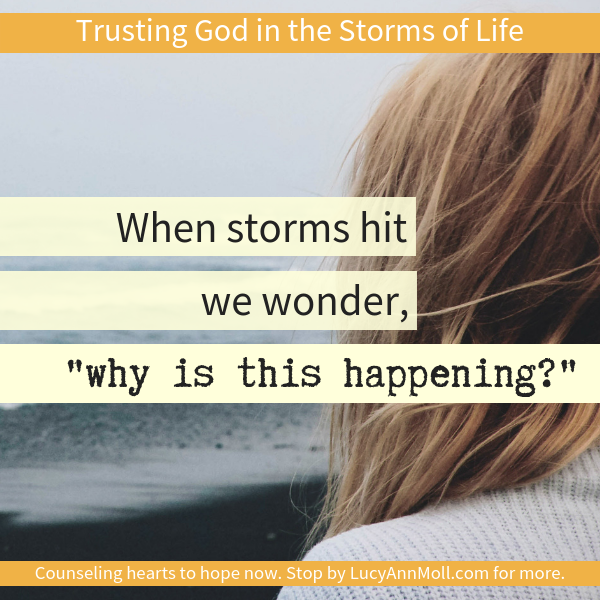
by Lucy | Dec 4, 2018 | biblical counseling, emotions
The storms of life are unpredictable and scary. But God’s up to good. And you can trust him in them.
Click & Tweet!
Featured in Heart2Heart Counseling Directory, Shannon Kay McCoy shares 3 lasting lessons on the storms of life. Be sure to check out her personal counselor page here.
Her article appeared first here at The Biblical Counseling Coalition and is used with permission.

While growing up in South Carolina, I loved thunderstorms. I watched the howling wind blow leaves from the tree branches and the raindrops beat down on the grass under the dark, gray sky.
If we were at my Granny’s house, she would make us unplug everything electrical. That meant no TV or radio (there was no internet in those days). My siblings and I had no other choice but to play with each other. We found a way to endure the storm until it blew over.
Sometimes storms can cause much damage and wreak havoc in the lives of many. While the news focuses on environmental storms, there are other storms just as devastating that people experience every day, such as sickness, financial hardship, and broken relationships. These storms of life threaten our peace, comfort, and joy, and often bring about fear, doubt, and hopelessness.
Jesus Calms a Storm
In Mark 4:34-41, the disciples found themselves caught in a ferocious storm while on a boat in the middle of the Sea of Galilee and simultaneously in a spiritual storm of fear and doubt. They feared for their lives. Jesus was fast asleep in the stern of the boat while the storm was raging. They woke Him and said,
“Teacher, do you not care that we are perishing?” (4:38).
 Jesus woke up, calmed the storm, and questioned their faith in Him (4:40). They were no longer afraid of the storm, but very afraid of the supernatural power of Jesus that led them to wonder who He was, that even the wind and sea obey Him (4:41).
Jesus woke up, calmed the storm, and questioned their faith in Him (4:40). They were no longer afraid of the storm, but very afraid of the supernatural power of Jesus that led them to wonder who He was, that even the wind and sea obey Him (4:41).
The disciples learned significant lessons that day that transformed their lives. We can learn much from their experience as we face the storms of our own lives.
God Ordains the Storms of Life
The idea that God permits bad things to happen to His children is a very hard pill for some of us to swallow. “It doesn’t make sense for a loving God to allow His followers to suffer,” some would say. This is a simple conundrum to solve.
Jesus tells us in John 16:33,
“In the world you will have tribulation. But take heart; I have overcome the world.”
Jesus promises us that we will have trials and tribulations in this world, but because He has overcome the world, we can trust Him in the storms.
Click & Tweet!
When storms hit, we often wonder, “Why is this happening?” In James 1, we see that God has a purpose for every trial that we experience. God uses trials to test the genuineness of our faith.
The disciples’ faith in Jesus was being tested in the storm. They questioned the very character of Jesus, implying that He did not care for them. We may feel the same way when we face a health crisis or a financial hardship that may cause us to lose our home. But 1 Peter 5:7 reminds us to cast all of our cares and concerns on Jesus, because He cares for us.
God Is in Control of the Storms of Life
The disciples were filled with great fear when Jesus rebuked the wind and told the sea, “Peace! Be still!” (Mark 4:39). Jesus displayed amazing supernatural power over nature. We learn, along with the disciples, that Jesus can be trusted in the storm. This is because He is sovereign.
God’s sovereignty is described in Psalm 24:1-2:
“The earth is the LORD’s, and everything in it, the world, and all who live in it; for he founded it on the seas and established it on the waters.”
God is in perfect control of the universe. He is involved in everything in this world and is directing all things, people, nature, etc. to fulfill His divine purposes. When facing the storms of life, understanding the sovereignty of our amazing God is essential.
The disciples showed us both what to do and what not to do. They were right to go to Jesus in the storm. However, they fell short because they went to Him in fear and doubt. Jesus wanted them to have faith in Him in the midst of the terrible storm. In Philippians 4:5-6, we learn how to replace our fear and anxiety with prayer, supplication, and thanksgiving.
We are released from the grip of fear and anxiety when we thank Him for His sovereign power and purpose for the storms. We can trust His promise that His peace will guard our hearts and minds so that we will not be fearful or anxious during the storm (Phil. 4:7).
God Is for You in the Storms of Life
In their fear, the disciples questioned if Jesus cared for them. He asked them, “Why are you so afraid? Do you still have no faith?” (Mark 4:40). Not only did Jesus rebuke the wind and the waves, but He rebuked the disciples for their unbelief.
Their unbelief caused their fear, and their fear caused them to question whether Jesus really cared. Jesus expected them to know that He was for them and that He did not want to destroy them.
Isaiah 41:10 states,
“Fear not, for I am with you; be not dismayed, for I am your God.”
Believing that God is for you can transform your life. When trials come, you will not be tempted to doubt God’s love, care, and concern for you. When it seems like there is no sound coming from Heaven, you can still believe that God is for you.
The storms of life are part of God’s sanctification plan, revealing your heart, and growing you into His image. Do not let the difficult storms become bigger than the promises of Jesus.
Click & Tweet!
He promises to be with you through any storm that He allows in your life (Isa. 43:2). Allow the storms of life propel you to trust God as your refuge and deliverer.
Questions for Reflection
- When the storms of life hit, what is your first reaction?
- Can you look back on previous storms in your life and accept that God ordained the storm and was in control of it?
- How will the realization that God is for you impact your fear?
Resource for YOU
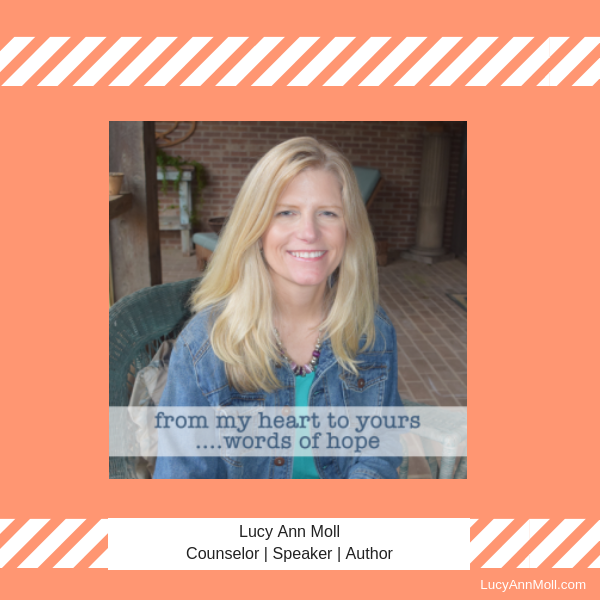 I have the awesome privilege of counseling women and families by Skype and FaceTime all over the world! If you’d like to know more about this wonderful resource of online counseling, please look over this and be sure to request a complimentary counseling phone consult. Cheers!
I have the awesome privilege of counseling women and families by Skype and FaceTime all over the world! If you’d like to know more about this wonderful resource of online counseling, please look over this and be sure to request a complimentary counseling phone consult. Cheers!
Counseling Hearts to Hope,

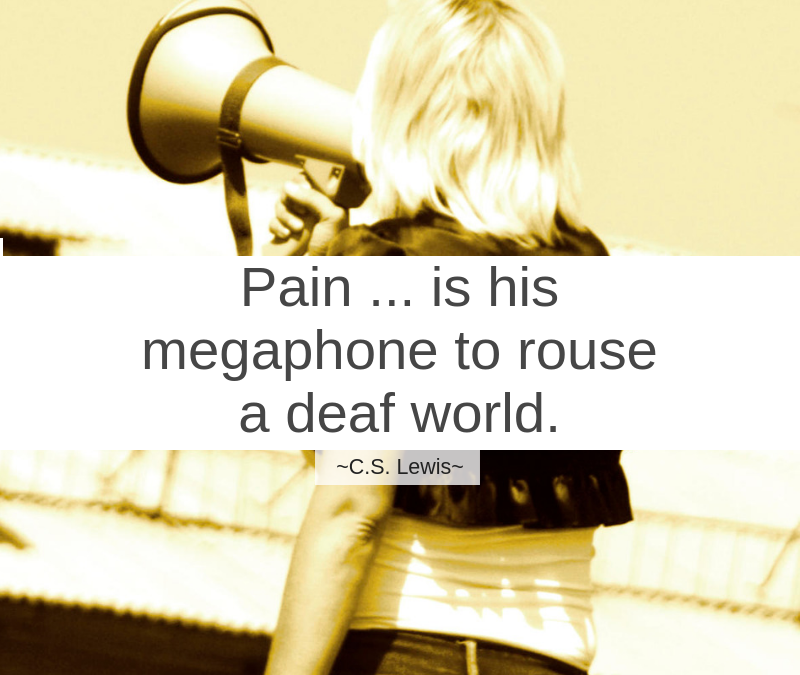
by Lucy | Sep 6, 2018 | emotions, whole health wellness |
My mistake began as many bad things do. . .with no warning.
Click & Tweet!
I had skipped my gym workout. So to appease my guilt, I decided to stretch gently for a few minutes then do 25 full sit-ups. Bad mistake. You see, very soon I’d injure myself. And soon after my physical injury, emotional pain would hit me upside the head.
And as my pain worsened — physical and emotional — I learned 3 lessons I’ll share in just a moment.
Have you made a mistake too? What pain did you experice?
My Sit-Up Mistake
Now back to my sit-up story.
On that day which I’d love to erase from the calender, I tucked my feet under the couch, laid on my back, and rolled all the way up. (Seriously, friends, do NOT perform sit-ups this way. Too late I learned this truth from Bob and Brad, popular YouTube physical therapists. Check out this video of 15 exercises to never do.)
On my eighth full sit-up, something in my back felt weird. But I pressed on and completed two more sit-ups, far short of my goal. I rubbed my back and called it a day — and didn’t think much of my situps
until the next morning
when I awoke to an intense clenching in the muscles in my lower back and numbness in my legs. I elbowed my snoozing husband.

“Steve, something’s wrong. I need your help. Steve, wake up.”
I worried. (Yes, I know worrying is a sin.) Yes, pain had gotten my attention.
More Problems Hit
As I rested and got pampered by my family who cooked, laundered, and swept, as my cats curled next to me, I found out that a close family member needed daily injections. Nothing life threatening, but just another thing to handle. Time passed. My back injury lingered. And my emotional pain intensified. Dare I admit, I asked “Why me?”
I remember thinking and praying,
“God, the doctor said I should be better in four to eight weeks. I’m not. Walking and standing hurts, and my legs and feet feel bubble-wrapped, and now a family member is hurting. Help us.”
Then, health difficulties slammed two more family members and I prayed again.
And again.
More intensely.
Louder.
Desperately.
You may have heard this quote by C.S. Lewis:
God whispers to us in our pleasures. He speaks to us in our conscience, but He shouts to us in our pain. It is His megaphone to rouse a deaf world.
God was rousing me.
3 Take-Ways After a Mistake
You and I each have dealt with mistakes of all sorts–physical, emotional, relational, and spiritual. Until we see Jesus face to face, more pain will come. Sometimes a drizzle, sometimes a thunder and lightning and darkness.
As I’ve pondered these things and sought God’s counsel, I learned three things from my mistake.
1. God wants to meet with us. In other words, He wants us to talk with him and listen to him, prayerfully. Psalm 10 is great example.
2. God blesses you and me. Ephesians 1:3 underlines the truth that we who love Jesus have been blessed with every spiritual blessing in the heavenly realms. Every means every. You do not need to get more blessing. You have it all. Now.
3. Whatever happens as a result of a mistake, God knows what He is doing, for his glory and our good.
Click & Tweet!
It’s unimportant we understand it all. God does. He is in control. I am not.
What’s the bottom line? I believe God is good and sovereign and all-wise. He remains true when I falter. And so I hope in him. Even when I’ve made a mistake. Even when pain comes.
Question: What have you learned when you’ve made a mistake? If you have a moment, please leave a comment.
Counseling Hearts to Hope!

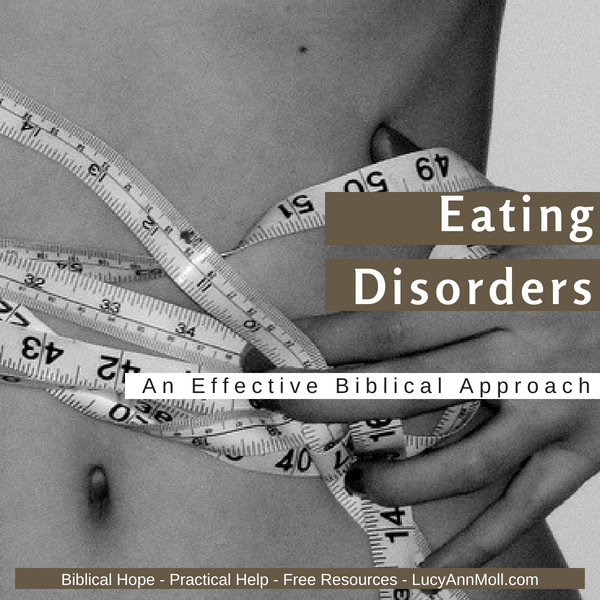
by Lucy | Aug 7, 2018 | biblical counseling, emotions, whole health wellness |
Eating disorders — this problem has a comprehensive Christ-centered solution. It involves biblical counseling and often medical professionals for lasting change. Guest blogger Hayley Satrom, a biblical counselor with HeartSong Counseling in Washington, D.C., shares her article that originally appeared on the Biblical Counseling Coalition website and is used with permission.

As a biblical counselor, I meet with many people whose lives, hearts, and minds are controlled by an obsession with food. Whether anorexia, bulimia, or binge-eating, disordered eating patterns are very common among my counselees. I’ve also found that often they need professional assistance beyond what I alone can provide.
Now, hear me out. I believe there are many counseling issues we biblical counselors can face without additional help from other trained medical professionals. That said, eating disorders, in my opinion, are simply not of that category.
After working with many anorexic and bulimic individuals, I have come to respect, and indeed mandate, a team approach to their care.
A Three-Pronged Approach
It was actually my supervisor, Deepak Reju, who was the first to suggest I utilize what he called a “three-pronged approach” in caring for counselees with eating disorders. “What are these three prongs?” you ask.They are:
- Biblical counselor
- Medical physician
- Nutritionist.
I now live by these three prongs when I counsel folks with eating disorders. Also the additional support has served me well as a counselor, and more importantly, has served my counselees.
Why the Extra Help?
On our best days, I like to think of biblical counselors as “specialists” when it comes to unearthing and tackling heart issues. And we do this by God’s grace—through His Spirit, by His Word, and in His church.
So please hear me that I am well aware that eating disorders are fraught with many heart issues. These heart issues include control, escape, body image distortion, anxiety, depression, distrust of God, confusion about God’s character, fear of man, and the list could go on and on. This list only begins to describe the important themes that a biblical counselor can and should unpack with someone who struggles with an eating disorder.
Is this enough, though? When a woman is abusing her physical body through either deprivation or bingeing of food, is processing heart issues the only help she needs? I can tell you that, from my experience, the answer is “No.”
In fact here are just a few of the ways a physician and nutritionist have come to my aid in counseling folks with eating disorders in the past:
Physician:
- Can tend to the innumerable health problems that are consequential to eating disorders (gastrointestinal disorders, heart problems, low blood sugar, fainting spells, etc.);
- Tests the body for important nutrients that may be low for someone abusing food (e.g. potassium, iron) and can prescribe supplements when needed;
- Will track the patient’s weight over time and can flag if the need for more intensive inpatient care is required;
- Can prescribe psychiatric medication if needed (or a psychiatrist could be used for this as well).
Nutritionist/Dietician:
- Manages everything food-related for the counselee;
- Creates meal plans for breakfast/lunch/dinner/snacks for a typical day and week;
- Provides specific accountability for food-related plans and goals;
- Conducts weekly weigh-ins (often blind to the patient) for the counselor and physician to refer to in monitoring the counselee’s progress.
As you can see, physicians and nutritionists can be of great help to the biblical counselor in caring for someone with an eating disorder. In fact, their support regarding the patient’s health and food needs allows a biblical counselor more freedom to spend the time in counseling appointments on what we do best—tending to the heart issues underneath the symptoms.
How Does It Work?
In practice, I try to meet weekly with counselees who are actively struggling with an eating disorder. I also suggest weekly meetings with their nutritionist for the sake of ongoing help in food-planning and accountability, as well as regular weigh-ins. Weigh-ins are particularly important for anorexic counselees. Their health and even very life are at risk if their weight drops too low.
Physician appointments do not need to be so frequent, unless specified by the doctor. In general, I find it best to allow the physician to lead the conversation on how frequent the patient needs to see him or her. Frequency of visits will depend upon the specific health challenges that exist due to the eating disorder, which is different for every counselee, of course.
I think it is helpful to check in with the physician and nutritionist every month or so to share notes on the counselee and to discuss next steps in coordinating her care.
Linking Hands
As biblical counselors, we provide an invaluable service of helping others change by addressing the heart issues that underlie thoughts and behaviors. We try to lead people to Christ—to know Him, trust Him, and lean into Him for help with even the hardest struggles. This service is necessary and irreplaceable. That said, in some situations we can do more. In fact, in some situations we NEED to do more.
An eating disorder is one of those situations. Eating disorders can be dangerous with many physical health consequences. Let’s link hands with other experienced caregivers who can advise our counselees on certain matters better than even we can. By caring for our counselees’ souls, minds,and bodies surely we will bring much glory to God.
Join the Conversation
- What are your convictions regarding biblical counselors engaging with other care-giving professionals?
- What else have you found to be helpful and effective as you care for individuals with eating disorders?
- Maybe you have even struggled with an eating disorder yourself. What advice would you give to caregivers?
Counseling Hearts to Hope,

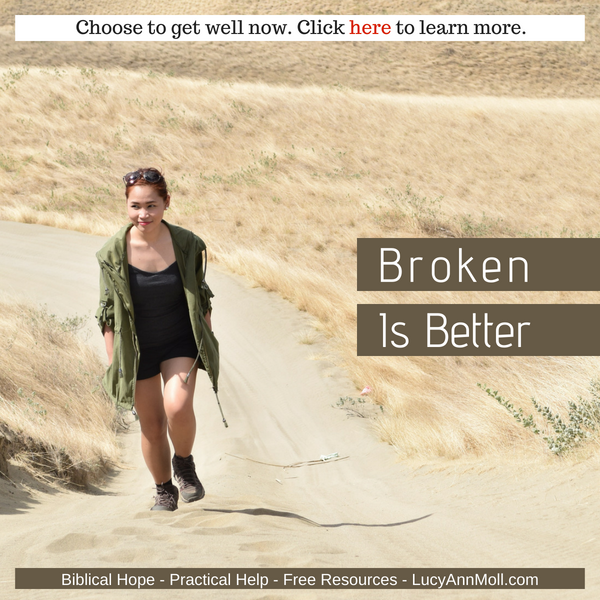
by Lucy | Jul 24, 2018 | biblical counseling, emotions
Broken is better.
Guest blogger Suzanne Holland — see her page HERE on Heart2Heart Counseling Directory — brings home the truth that your reponse to life’s problems is what matters. And a biblically healthy response is what ultimately brings glory to God. Her article appeared first here and is used with permission. –LAM
In This Life, You Will Have Trouble
Life is full of pain and suffering. In a world of uncertainty, there is only one sure thing: You will have trouble.
Yet man is born to trouble
as surely as sparks fly upward. (Job 5:7).
The only thing that is optional is your response to that trouble.
Click & Tweet!
So you have many choices when it comes to how you respond emotionally to pain and suffering in your life. Now I’d like to talk about a few of those, some or all of which you may have chosen in your time of trial. Then I’d like to share a choice that is always better.
Respond with Fear
First, you can respond to your pain with fear. If you have a chronic or debilitating illness, you may be fearful of a new or worsening pain or symptom. And you may begin to wonder what you will do if it continues to get worse.
How will you cope? Who will take care of you? What will you do when you can’t do what you need to do? Fear of increased pain gangs up with panic about the future. Pretty soon, you have bullied yourself into a fear response. This fear drives you more into yourself, and away from God. (For Help for Fear, contact Lucy. She’s been there and tossed the T-shirt.)

Respond in Anger
Or, you may choose to respond in anger, telling yourself that you don’t deserve this, and that it’s not fair.
This response seems more powerful than fear. Instead of cowering in a trembling heap, you shake your fist at your condition, your doctor, or maybe even at God. This anger gives you a false sense of empowerment from within, and causes you to think that you don’t need God’s power. But this puts distance between you and your great High Priest.
Respond with Despair
A third response that is common among suffering believers is despair. Maybe you’ve been knocked down many times, but have managed, by the grace of God, to get back up again. Now, after many TKOs, you have given up. You just don’t have the fight in you anymore.
Somewhere along the way, you started looking to your own strength for the next round. But now that strength is spent. You can’t get up again, and you really don’t even want to. You are done.
Risk Bitterness
All of these responses can lead us to one very dangerous place: Bitterness. A person who is bitter has probably been through all three of these responses, and possibly several others, before arriving at bitterness. When these fleshly attitudes go unchecked, they inevitably lead us to a place where we have little or no faith in God, and we really don’t care.
We are disappointed, angry, and without hope. We nurture and feed grudges against those who have harmed us, and we curse God, and anyone else, who has denied us what we believe we are entitled to. This is bitterness.
According to Isaiah 43:7, we were created for God’s glory.
…everyone who is called by my name,
whom I created for my glory,
whom I formed and made.
If this paragraph describes you, ask yourself, “How does my bitterness glorify God?” If you’re honest, you will have to confess that your bitterness does not, and could never, bring glory to God. In fact, if bitterness persists, and you are just fine with it, you might want to examine whether or not you are even a believer.
A Better Alternative
However, there is another alternative. Rather than becoming bitter, we can confess and embrace the fact that we are broken. Our body is broken. Our heart is broken. We have no strength or power left to fight what God is doing through our trial.
We must submit to His will for us, surrendering our desire to control our situation. So we must hand over our pain, our suffering, our fear, anger, and despair to Him.
He alone is able to handle them. He loves us, and desires to make us more like Him. And he wants to use this pain to bring us into His arms. He wants to take our heavy burden of fear, anger, and despair, and exchange it for His light, easy one.
Plea for Understanding
Dear sister in Christ, you are weak. If you have convinced yourself otherwise, you are deceived. (Jeremiah 17:9). I know you may not like to hear that you’re weak and broken, but please believe me when I say that this is a good thing!
Hear the words of the apostle Paul, who suffered so many things for the sake of the Gospel:
Therefore I take pleasure in infirmities, in reproaches, in needs, in persecutions, in distresses, for Christ’s sake. For when I am weak, then I am strong (2 Corinthians 12:10).
This statement follows Paul’s description of his pleading with the Lord to remove the thorn in his flesh. God’s answer?
My grace is sufficient for you, for my strength is made perfect in weakness (2 Corinthians 12:9).
Do you want God’s perfect strength in your battle against pain and the heartache that comes with it? Do you believe that God’s grace is sufficient for you?
God has given you your weakness as a gift, to help you bring glory to His great name and to make you more like His precious Son! Give in to fear, anger, and despair, and you will be bullied, powerless, and hopeless. Once you get there, you are standing at the doorstep of bitterness.
Turn from these things, my friend, and be broken. Broken is better.
Counseling Hearts to Hope,


by Lucy | Jul 18, 2018 | biblical counseling, emotions
When you feel overwhelmed, your emotions can get the best of you, can’t they? And you feel out of control and all alone. The inner noise is deafening!
You need peace and quiet in your soul, don’t you?
When overwhelmed, you may self-sabotage and cut or snarf donuts or call yourself names like “loser” even though God says you blessed and beautiful in Christ. Years ago, I felt like a loser when my first job out of college stressed me to the max, and when I couldn’t get pregnant, and when my mood nose-dived into black after my mom died.
But God doesn’t call us to walk by feelings, right? He calls us to walk by faith!
Click & Tweet!
For we live by faith, not by sight. 2 Corinthians 5:7, NIV
Through personal experience and my training as a Christian biblical counselor, I discovered at least 3 solutions to peace and quiet when you’re overwhelmed by life.
Solution #1: Tune In
Tune in to your emotions. They may signal something’s wrong.
a ding-dong hacks your Facebook account. . .ANGER,
your husband is home late, again. . .FRUSTRATION,
the basement floods. . .MORE FRUSTRATION,
your close friend moves away. . .SADNESS,
and the neighbor lady gets a shiny, new Lexis while your car pushes 100,000 miles. . .JEALOUSY.
Recognizing your emotions helps you decide your next constructive action and buoys your hope. In the examples above, you may have thought something like:
“Err! Did the ding-dong steal my personal information too? Stupid, stupid, stupid.”
“Doesn’t my husband care about me? Even worse … is he cheating on me?”
“Is that stupid sump pump busted? Replacing the carpet will cost so much. I am so mad.”
“Now I don’t have any friends.”
“Show off! I hope a tree falls on your pretty car.”
ACTION: Write down one of today’s hard emotions and ask yourself, “What was I thinking at or just before my emotions hijacked my peace”? What you think influences how your feel. Here’s a thought journal that may help.
Solution #2: Remember
Friend, you can’t choose your circumstances but you can remember to whom you belong: Jesus Christ. (If you’re not sure you are a Christian — a person to believes in the person and work of Jesus Christ — please contact me.) Remember:
You are the daughter of God. You have EVERY spiritual blessing now. And you are completely forgiven, now and forever.
Also, you have a home in heaven Jesus is preparing for you now.
ACTION: Read Ephesians 1:3-14 every day. Replace the pronoun us and we with your name.
Solution #3: Go to the One
When your emotions signal that you’re overwhelmed, go to Jesus. Talk with him. Stop trying to figure things out. Turn off the bad tapes that play likes over and over to ad nauseam.
Rather, tell Jesus your burdens. Trust him to work in you so he can shine through you. Your friends, family, neighbors and coworker will notice your bright eyes and smile.
This is what you want, isn’t it? Peace and quiet is the noise of life.
Now What?
I invite you to counsel with me to find hope, peace, and godly contentment. Simply contact me. Reaching out is the first step to healing. By the way, I also meet with counselees ALL OVER THE WORLD by Skype, FaceTime, and WhatsApp. So don’t let proximity get in the way of getting well, okay?.
Counseling Hearts to Hope,


![]()
 Jesus woke up, calmed the storm, and questioned their faith in Him (4:40). They were no longer afraid of the storm, but very afraid of the supernatural power of Jesus that led them to wonder who He was, that even the wind and sea obey Him (4:41).
Jesus woke up, calmed the storm, and questioned their faith in Him (4:40). They were no longer afraid of the storm, but very afraid of the supernatural power of Jesus that led them to wonder who He was, that even the wind and sea obey Him (4:41). I have the awesome privilege of counseling women and families by Skype and FaceTime all over the world! If you’d like to know more about this wonderful resource of online counseling, please look over this and be sure to request a complimentary counseling phone consult. Cheers!
I have the awesome privilege of counseling women and families by Skype and FaceTime all over the world! If you’d like to know more about this wonderful resource of online counseling, please look over this and be sure to request a complimentary counseling phone consult. Cheers!








